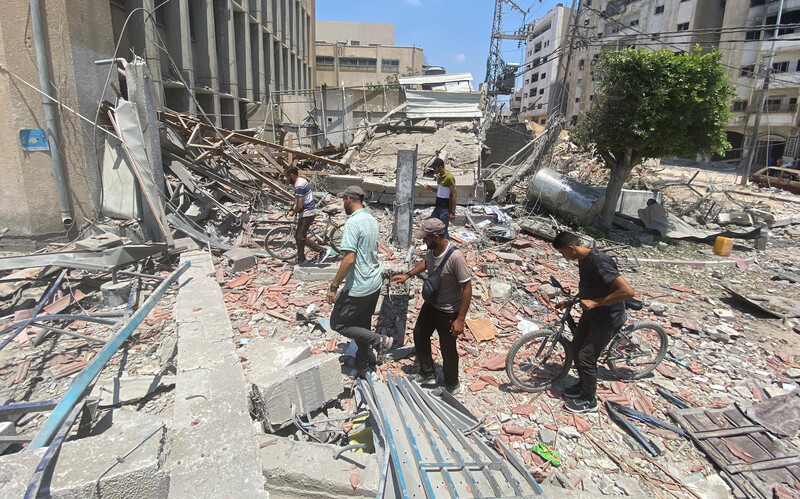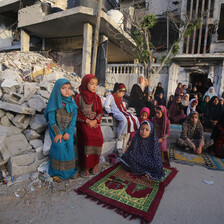The Electronic Intifada 8 October 2024

People look for survivors after an Israeli aistrike on the headquarters of UNRWA in Gaza on 23 June 2024.
APA imagesOn the morning of 23 June, my father said he received a message saying we had been “chosen to receive a food parcel.”
We were overjoyed. There wasn’t much left to buy from the market, especially in northern Gaza, where food shortages were getting worse by the day. The shelves were mostly bare, except for a few canned goods.
“Get ready to pick it up,” my father told me.
My little brother Anas,12, and I quickly had breakfast and got ready to leave. My father handed me keys to the bus and his ID card. “Drive carefully,” he said.
My mother prayed for our safety and that we would return home unharmed.
Anas and I got into the bus, but just as we were about to leave, my older brother, Ahmed, stopped us. He wanted to visit a friend who lived near the distribution center.
We set off for the Rimal district. Destruction was everywhere. Streets were riddled with craters, and houses, shops, mosques, universities, including the one I attended, as well as schools were all in ruins. Almost nothing was recognizable.
When we arrived, Rimal felt like a ghost town. I know those displaced to the south long to return home. But I’m not sure they would recognize Gaza. Everything beautiful has been erased by the Israeli military.
The district, once busy with people and traffic, was now nearly empty. The destruction forced me to take a longer, more complicated route.
“Drop me off here and call me when you’ve got the parcel,” Ahmed said.
“I will,” I replied and continued on.
At the distribution center, there was already a long line. I joined the queue, leaving Anas in the bus to wait for me. Overhead, Israeli drones buzzed incessantly. The noise was irritating, and I had a feeling something bad would happen.
Detour
As we waited, people around me started talking about the Israeli genocide. Conversations drifted from rising prices to food shortages, displacement and the daily struggles we all faced.
Finally, it was my turn.
“I need your ID card to verify your information,” the employee said.
After the check, I was handed a large box filled with essentials — sugar, rice, oil, beans, salt, and other staples. It was a huge relief after months of deprivation.
I loaded the box into the bus.
“Mosab!”
I heard someone calling my name.
I turned and saw it was our neighbor. “Could you do me a favor?” he asked.
“Of course,” I replied.
He explained that he had left a bag of flour at the United Nations Works and Relief Agency headquarters, only about 200 meters from the distribution center, and asked if I could pick it up for him.
I called Ahmed to tell him about the detour.
When I arrived at the main gate of the UNRWA headquarters, a barrier blocked entry. As Anas got out to move the barrier, I noticed a child, maybe about 9, talking to him. He seemed to be Anas’s friend.
Anas moved the barrier, and I prepared to drive in.
Suddenly, there was a deafening explosion.
For a moment, I thought the bus was the target. I felt like time had stopped, and I was certain I was about to die.
I was reciting the shahada, the Islamic declaration of faith, when another Israeli airstrike hit.
“Am I still alive? What is happening?” I asked myself.
Where’s Anas?
The air was thick with dust and the smell of gunpowder. My vision was blurred and breathing was difficult.
The windows of the bus were shattered, and debris was everywhere. My right arm and face were bleeding. I couldn’t hear anything. The force of the blast had left me momentarily deaf.
I grabbed my things and stumbled off the bus.
“Anas! Anas! Where are you?” I screamed.
Despite the dust in my eyes and the rubble, I kept searching, but my hope of finding Anas alive was fading as he didn’t reply. I desperately hoped he could hear me.
I couldn’t see clearly or even open my eyes fully. The swirling dust continued to obstruct my sight.
I started feeling my way and moving forward to the barrier — the last place I saw Anas.
Suddenly, I spotted him. He was on the ground and covered with rubble and blood.
I rushed to him.
“Anas, can you hear me? Wake up! Please wake up,” I said, tears streaming down my face.
“May Allah pour His wrath on Israel,” he muttered painfully.
Hearing him speak brought a wave of relief — he was alive. But he seemed badly hurt, with shrapnel wounds and burns to his head, arm, face and back. I helped him stand, and we slowly moved away from the area that had been hit.
People nearby came to help and someone called for an ambulance.
After many unsuccessful attempts to call my mother due to the poor network connection, I was finally able to get through.
“Anas and I were injured in an airstrike, but don’t panic. We’re waiting for an ambulance,” I said. I could barely hear her response due to the damage to my hearing, and then the line disconnected.
I spotted Ahmed about 25 yards away, staring at the bus in shock, not realizing we were okay.
I called out to him, and he finally saw us.
“Are you all right? You’re bleeding!” he said.
“Don’t worry about me. We need to get Anas to the hospital,” I replied.
Excruciating pain
Within minutes, two ambulances arrived. I told the people who came to help that there was a child still trapped under the rubble.
We rushed to al-Ahli Hospital in one of the ambulances. I kept asking the paramedics about Anas’ condition. I didn’t care about my own injuries. All I could think about was him.
We arrived at the hospital to find my father waiting for us. He was worried to the core. We were taken into the emergency room, where we sat on beds waiting for medical attention. There were too few nurses, but eventually, one came over and began cleaning the dust and blood from Anas and me.
“You have shrapnel in 19 places in your right arm and underarm that I need to remove and then stitch. There is no anesthesia,” the nurse cautioned after examining me. “Brace yourself.”
The pain was excruciating. He removed several pieces of shrapnel from my arm, the largest about the size of a coin.
One fragment under my arm was lodged too deeply to remove, but the nurse reassured me it wasn’t dangerous and would eventually come out on its own.
After some tests, I was told I wasn’t in any immediate danger.
I went to check on Anas. He was in terrible pain from the burns, but the nurses said his injuries weren’t life-threatening. He needed to wait for a specialist to evaluate his condition.
As the day wore on, neighbors and friends came to visit us. When they left, Ahmed and I stayed by Anas’ side, trying to comfort him.
The specialist arrived and confirmed that Anas had second-degree burns but no fractures or internal bleeding. He would need to stay in hospital for treatment.
My father and I left, leaving Ahmed with Anas. When we finally got home, my mother embraced me tight. She had tears in her eyes.
I was extremely exhausted and overwhelmed by the pain and the day’s events.
Later, I heard on news broadcasts that eight people had been killed in the day’s strike on the UNRWA headquarters.
The boy Anas had been talking to had been killed. Even though I didn’t know him and didn’t even know his name, I grieved for him like I would a friend.
I tried to rest, but I was unable to sleep because of the pain. The same question kept circling through my mind: “Am I really still alive?”
The next day we went back to see if our food parcel was still there.
It was not.
Mosab Habboub is an English language and literature student in Gaza.


